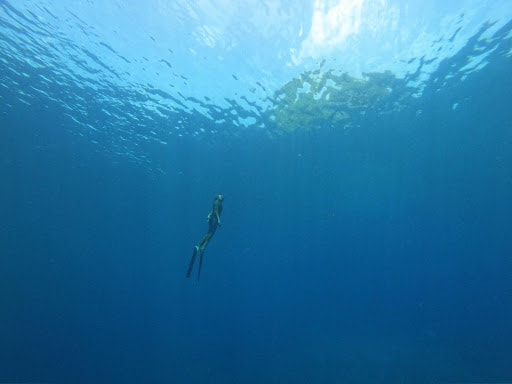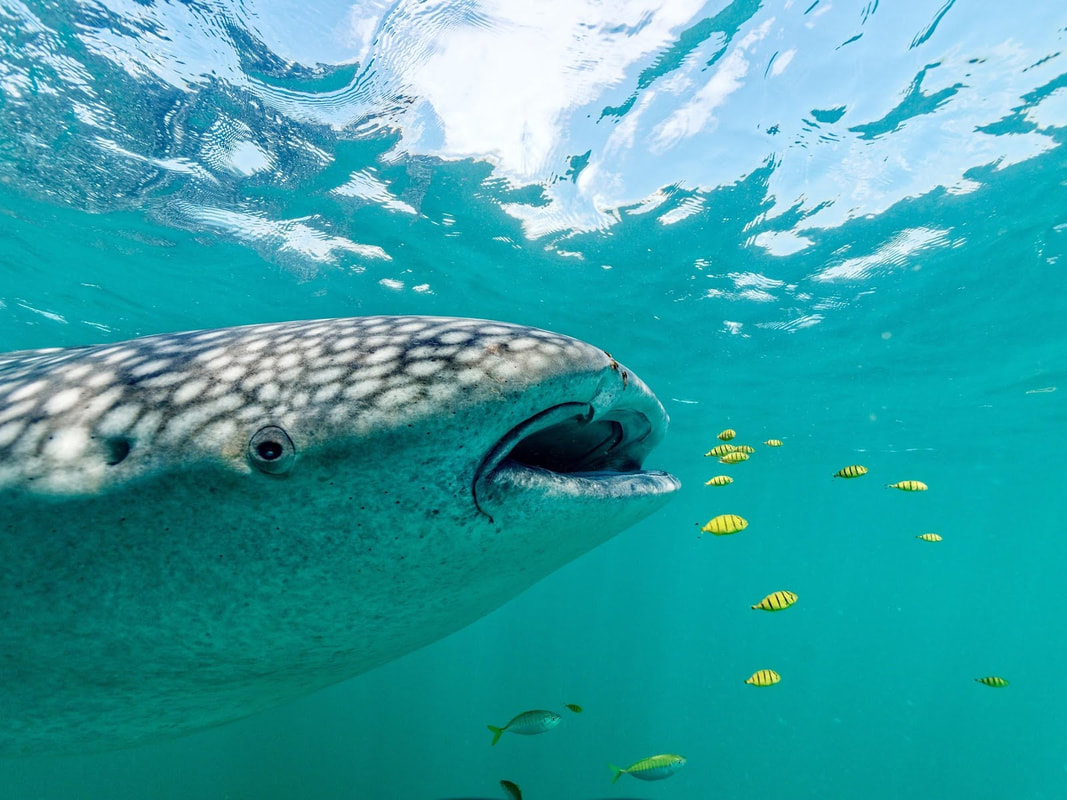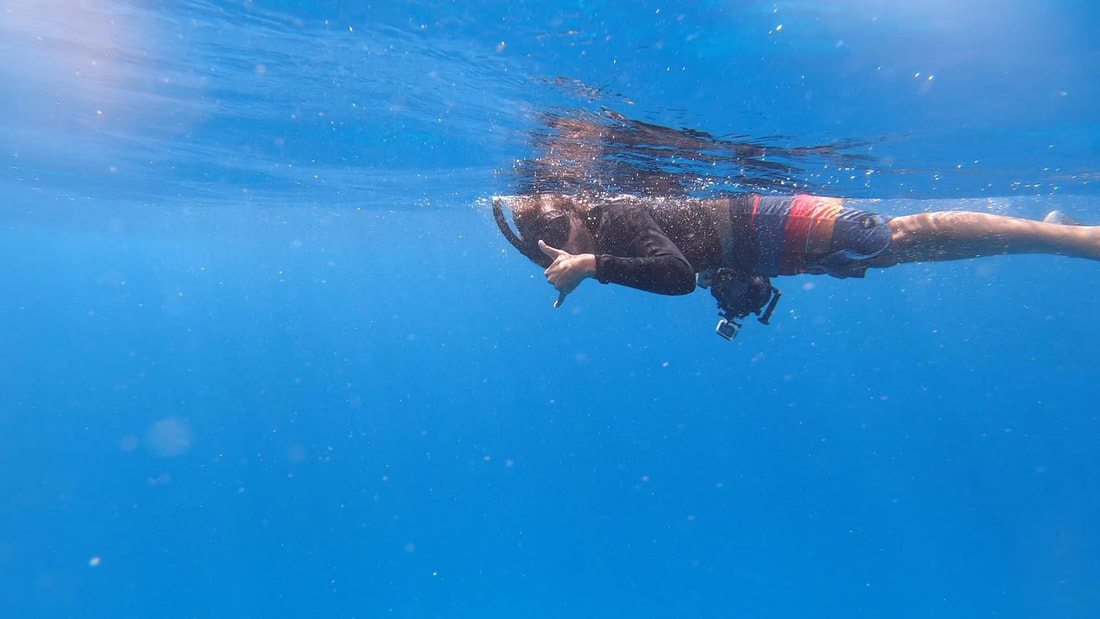|
By Guest Writer Robin McGahey  Jahawi Bertolli is a Wildlife Photographer/Cameraman, Freediver, Music Producer, Co-Founder of East African Ocean Explorers Club, and 2019 National Geographic Explorer from Kenya. In honor of World Oceans Day, we talked with Jahawi to hear about his love of the water, experience as a diver, and his upcoming film, Behari Yetu. Q: First things first, how did you get into underwater filmmaking? It’s been a bit of a roundabout. I started with dance music, was signed with a label and was DJing and having fun in London. When I moved back to Kenya, I went from working on dance music to writing music for documentaries. Eventually, I got kind of fed up with sitting in a studio in Nairobi and decided I wanted to get out in the beautiful locations. The thing is though that wildlife filmmaking in Kenya is quite an elite club and I had no real camera experience. There are very few job opportunities and it’s difficult to get contracts. I still kept making dance-oriented music and one day we had been shooting a music video for a song that a friend and I had collaborated on and we needed an underwater shot so I jumped in the pool with a group and got the shots. I have always been very comfortable underwater holding my breath and my cousin, who was directing the shoot, joked that I should go and become an underwater cameraman and the seed was planted. I did a bit of research, found a course in Thailand, finished the project I was working on, and left. What was supposed to be a few months away ended up in 2 years living on an island in Thailand, training, becoming a Divemaster, free diving, and working on anything I could. Q: Did you grow up around the ocean? I grew up in Nairobi, but we had a house on the south coast of Kenya, in a wild part of the coast called Waa, that we would go to often. As a child, I would spend all day outside. I loved exploring and just being in the ocean, I’ve always felt very comfortable with it. Q: Are there any specific moments of your underwater filmmaking career that specifically stand out? Getting to the Galápagos was a big one. It was just such an incredible place with the most amazing biodiversity. I never thought I would get there so early on in my career. What’s been the most fun though is exploring more of Kenya’s coastline. A lot of the work that I did was in Thailand or the Galapagos, and then most of my dive training was in and around South East Asia. I’ve come to appreciate Kenya’s coastline more. Especially after being able to go around the world and see what’s out there. There are truly some special places here, especially the ones that no one knows about. Q: Have you recently had close encounters with some of the large marine animals? We set out to make a film on humpback whales last year, but we had one of the worst seasons on record, with such low turnout. I managed to get a couple of close up shots of them, but, as the focus of our film changed and we moved to the Lamu Archipelago, we began to encounter Whale Sharks much more often, and very close up. They were young, only about 3-4 meters, and at that size, they are curious and can spend a long time circling you and checking you out. I’m also very lucky to be able to spend some time with a particular pod of dolphins, which is always so uplifting. Q: What is your process for underwater filmmaking in Kenya? Are there big hoops you have to jump through in terms of regulations? Permits for underwater filmmaking are not as big of an issue for Kenya. Within Marine parks, you have to get permits from the Kenya Wildlife Service alongside your usual filming permits, but otherwise, it’s pretty straight forward. Outside of the marine parks though, you’re pretty free. We focus a lot on educational films for coastal communities and have worked with the Lamu county government before, and through the East African Explorers Club [his and his partner’s company] we are trying to figure out a joint project to set up locally managed marine protected areas. There’s definite interest in Lamu, as a county it wants to create an ocean use plan, similar to their land-use plan in terms of zoning and conservation. We’re very excited to be working with them on that. Bahari Yetu is Jahawi’s current project that he is completing alongside his partner and wife El, as part of his Nat Geo Explorer’s Grant. Q: What is Bahari Yetu? It means “Our Ocean” in Swahili. The story is how the ocean has changed through the eyes of old Swahili fishermen. Q: What inspired you to make this story in the first place? So last year we set out to do a Humpback Whale film, but as I mentioned before, they didn’t show up. During that process, we began interviewing fishermen to find interesting stories about the whales, how long they have been coming, what they had encounters with them, etc… By interviewing these fishermen a lot more came up in terms of issues they are facing, fish stocks declining, the way people are fishing, and we realized these are the guys that have been out on this ocean every day for their entire lives and have first hand seen the change. What people now see as the baseline for a healthy ocean really isn’t, and without these elders, this information could be lost. So by reporting these stories, we realized we could make a film that not only talks about these issues they’re facing, but also reaching into the old Swahili heritage, and hoping to get people to remember that they were custodians of the ocean and we have to be a lot more responsible with how we utilize it. Bahari Yetu became a conduit of these old fishermen’s stories, now coming to life in a film. Q: Why didn’t the Humpback Whales come last year? It’s hard to say, but we guess that it was due to the huge climactic event called the Indian Ocean Dipole, which is similar to El Niño. This meant that our side of the Indian Ocean was a lot warmer than it should have been and that drew a lot of moisture across East Africa. We think because of this temperature imbalance that the whales didn’t have to come up so far to find warm enough water to calve. Aside from the whales, the dipole made everything really strange for us. We had pretty consistent and heavy rain and in November, which is usually a great time for filming, the seas were rough and there was low visibility in the water. We had a few little windows to film in December and January, but it’s been a tough six months. Q: What were some of the other challenges you faced coming into this film? The heavy rains pretty much threw everything out of whack. The seas became rough, more so than expected, and because of the freshwater run-off into the ocean, it turned the water a sort of pea green, rather than its usual blue. Then there were jellyfish blooms, making it difficult to shoot. Worst of all, one of the reefs we’d been filming for years that had been looking really healthy, began to bleach due to the extended period of warm water. It was all hard to see. Q: Who are the audiences that you are targeting? Our main target audience is the coastal communities here in Kenya. We’ve found that the deepest connections between the audience and our subjects are to be formed here, because this is their home and their areas to protect. So we decided to take it a step further and have it all narrated in Swahili. Before COVID, we were hoping to take this film into the communities along the coast and do community screenings. It’s a message from the elder fishermen to the younger generation. Because a large base doesn't have TVs, we were going to set up a mobile cinema in the archipelago and take it to all of the local fishing villages, show the film and some other educational films and have a discussion about the issues. We’re hoping to take it to schools around Kenya as well. It’s still the plan we just have to get over COVID before we do anything, and when we do, we need to make sure we’re doing it correctly. Q: What advice do you have for the future explorers, filmmakers, or the kids seeing this film? We often get really caught up in the idea that we’re not in the right spot and want to go somewhere else, but the truth is that the best stories are the ones you care the most about. Oftentimes those are the ones right in front of you. It’s been really great that after traveling around the world, I get to focus on one spot, spend a lot of time there, and hopefully find something new. Half the time I go out I don’t even press record on my camera, sometimes I leave it behind all together and just take out a GoPro. Technology has improved so much that you have these tiny cameras that can capture great footage at a fraction of the cost of a proper underwater rig. Focus on telling a good story through your shots rather than the camera. There are several clips in the film shot on a GoPro, and it was from just us going out to see what was happening. Q: In your opinion, what’s the biggest threat facing our oceans?
The biggest threat to our oceans is us and our actions. Climate change, overfishing, pollution, it’s just one thing after another and unfortunately, the people most affected by these aren’t the ones doing it, and if they are it is usually out of desperation. The thing is, by looking at it as a whole, it can seem daunting and out of our hands but change can be made on a local scale. Through education and empowerment communities can survive better with the threats coming from climate change, manage fisheries, and pollution. So our message is that we really need to protect the reefs and mangroves and also understand the intangible benefits they give us. We need to realize that there is real value to our ocean and coastal areas, but there has to be local buy-in and real benefits to these communities. The ocean can seem like such a foreign place, especially to those who don’t swim, but it is such a beautiful place and by trying to portray its beauty and fragility through film we’re hoping to get people to fall in love with it, and if they do the better the chance we have of conserving it.
1 Comment
|
Archives
March 2024
Categories
All
|
Contact UsJackson Wild
240 S. Glenwood, Suite 102 PO Box 3940 Jackson, WY 83001 307-200-3286 info@jacksonwild.org |




 RSS Feed
RSS Feed